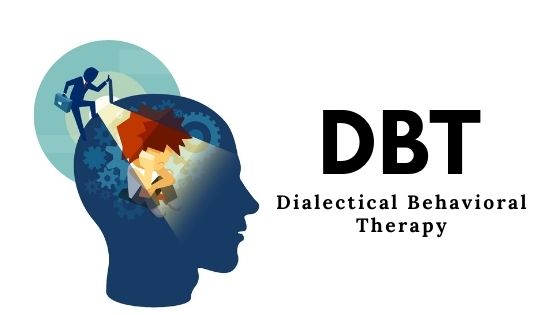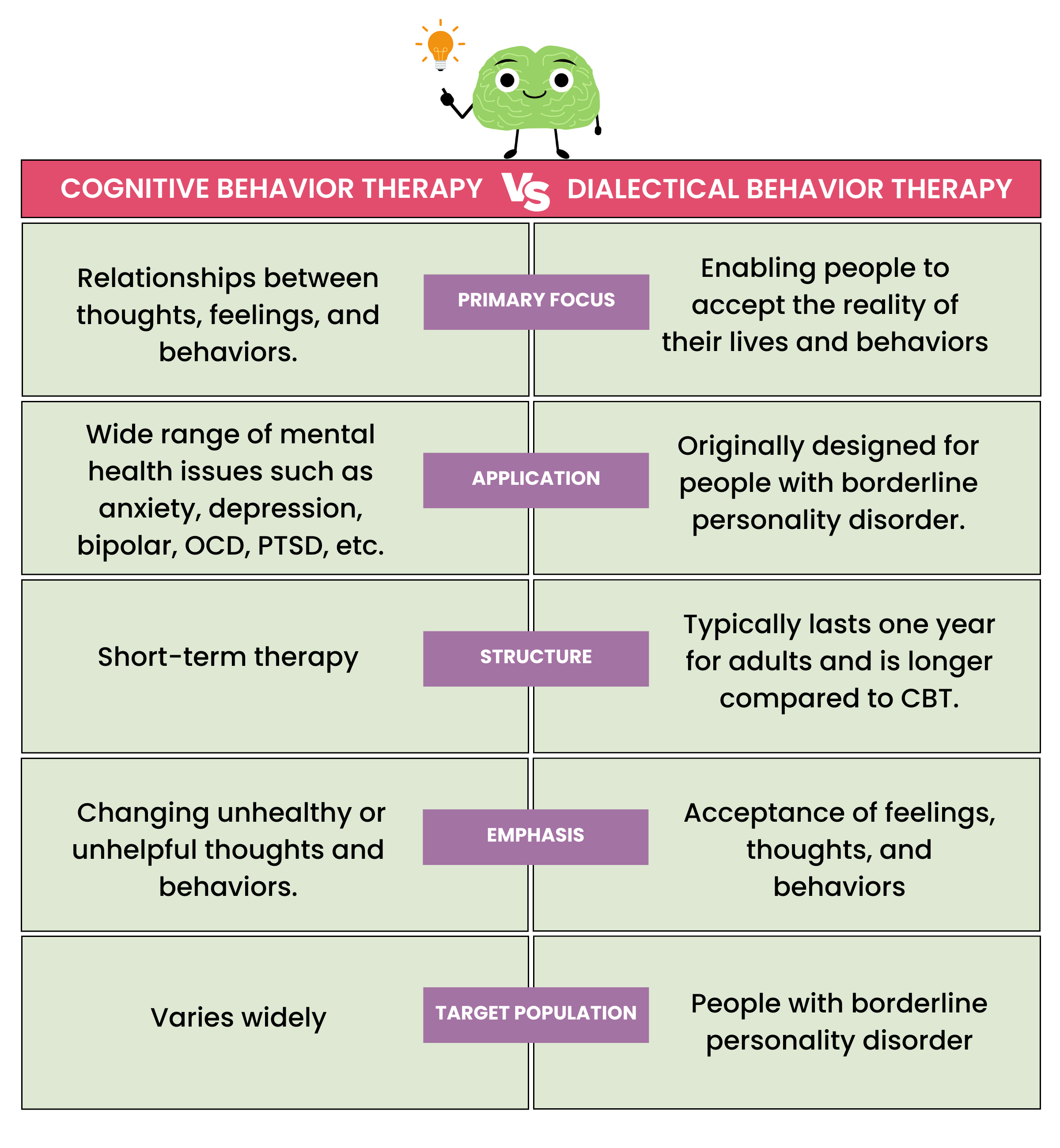Empowerment Through DBT London: Structure Resilience, Searching For Balance
Empowerment Through DBT London: Structure Resilience, Searching For Balance
Blog Article
Equipping People Through Reliable Dialectical Behaviour Therapy (DBT) Services: Structure Stronger Mental Wellness Foundations
In the world of mental health and health, the relevance of encouraging individuals via efficient Dialectical Practices Therapy (DBT) solutions can not be overemphasized. By focusing on the core principles of DBT, such as improving emotional regulation skills, improving social performance, building distress resistance methods, and growing mindfulness practices, people can begin on a trip towards building stronger mental health structures. The effect of DBT goes beyond plain signs and symptom monitoring; it uses an all natural strategy that gears up people with the tools required to navigate life's challenges with durability and self-awareness. As we explore the transformative possibility of DBT in empowering individuals to lead even more fulfilling lives, the path to boosted mental wellness and health ends up being an engaging story that bids expedition.
Comprehending the Core Concepts of DBT


One core principle of DBT is validation. Specialists using DBT recognize the patient's sensations and actions as valid responses to their environment. This validation helps construct a solid healing alliance and encourages people to function in the direction of change. One more basic element is dialectics, which educates people to see circumstances from multiple perspectives and discover the synthesis in between conflicting thoughts or feelings.
Furthermore, the principle of dialectical abstaining is central to DBT. This concept motivates people to avoid self-destructive actions while also approving themselves. By understanding and including these core principles, therapists can effectively apply DBT techniques and support individuals in their journey in the direction of emotional law and psychological health.
Enhancing Psychological Law Abilities
Establishing proficiency in taking care of feelings is a fundamental facet of cultivating psychological wellness and interpersonal efficiency - DBT London. Enhancing emotional policy abilities is a core part of Dialectical Practices Therapy (DBT) that equips people with the tools to browse extreme feelings in a healthy and useful manner. With DBT, individuals learn to identify, understand, and regulate their feelings, resulting in boosted mental health and wellness results
DBT emphasizes the significance of mindfulness, which includes being present in the moment without judgment. This technique permits people to observe their feelings without becoming overwhelmed by them, improving their capability to respond efficiently instead of respond impulsively. By growing mindfulness, people can create a greater feeling of self-awareness and emotional control.
In addition, DBT instructs useful abilities such as distress tolerance and feeling policy methods to aid individuals take care of tough feelings. By learning these skills, people can reduce spontaneous behavior, improve decision-making, and enhance their partnerships with others. Ultimately, boosting psychological regulation skills through DBT empowers people to lead more fulfilling and balanced lives.

Improving Interpersonal Efficiency
Having established a solid foundation in psychological regulation skills within the structure of Dialectical Behaviour Treatment (DBT), the focus now changes in the direction of boosting interpersonal performance. Improving interpersonal efficiency is a vital part of DBT as it outfits individuals with the essential abilities to navigate social communications, communicate efficiently, set borders, and build healthier relationships.
In DBT, interpersonal effectiveness skills are taught through components that concentrate on locations such as assertiveness, reliable interaction, and interpersonal problem-solving. By learning these skills, people can boost their capability to share their needs and needs, preserve self-esteem, and develop stronger connections with others.
Practicing mindfulness is an essential component of enhancing social effectiveness within the DBT framework. Mindfulness enables individuals to be existing in their communications, pay attention actively, and react thoughtfully instead of react impulsively. By integrating mindfulness right into their lives, individuals can grow higher self-awareness and psychological policy, which are important for successful interpersonal communications.
Structure Distress Resistance Methods
Discovering efficient techniques for managing emotional distress is necessary for individuals looking for to improve their coping abilities and resilience. Structure distress tolerance strategies is a crucial aspect of Dialectical Behaviour Treatment (DBT) that equips individuals to browse challenging feelings without ending up being overwhelmed.
Additionally, mindfulness practices play a significant duty in structure distress resistance. Mindfulness motivates individuals to stay existing in the moment without judgment, allowing them to observe their thoughts and emotions without responding impulsively. This recognition allows individuals to tolerate distress a lot more effectively and establish a greater sense of control over their reactions.
Along with these methods, producing an individualized distress tolerance strategy with the assistance of a skilled specialist can offer people with a customized approach to managing emotional distress - DBT London. By including these techniques into day-to-day live, people can reinforce their mental wellness foundations and enhance their general well-being

Cultivating Mindfulness Practices
To strengthen their distress resistance techniques further, people can concentrate on cultivating mindfulness techniques as a complementary strategy within the framework of Dialectical Practices Therapy (DBT) Mindfulness, a key component great site of DBT, entails taking note of the present moment without judgment. By promoting mindfulness, people can enhance their recognition of ideas, feelings, and physical feelings, promoting a deeper understanding of themselves and their experiences.
Mindfulness practices in DBT consist of techniques such as mindful breathing, body scans, and observing thoughts without accessory. These practices urge people to develop a non-reactive position towards their inner experiences, allowing them to reply to challenging scenarios with better clarity and composure. By including mindfulness into daily routines, people can find out to regulate their feelings a lot more successfully, lower impulsive behaviors, and grow a sense of inner peace.
With cultivating mindfulness practices, individuals undertaking DBT can develop a solid foundation for managing stress and anxiety, enhancing relationships, and improving overall wellness. By integrating mindfulness right into their healing trip, people can establish valuable abilities that empower them to browse life's difficulties with resilience and self-awareness.
Conclusion
To conclude, efficient Dialectical Practices Therapy (DBT) solutions play an important function in empowering people to construct more powerful psychological health and wellness foundations. By comprehending the core principles of DBT, improving psychological regulation abilities, boosting interpersonal efficiency, building their explanation distress resistance methods, and growing mindfulness techniques, people are outfitted with the required tools to navigate their feelings, connections, and difficulties in a much more flexible and resilient fashion. DBT services offer a detailed approach to promoting psychological health and equipping people to lead satisfying lives.
By focusing on the core principles of DBT, such as improving emotional regulation abilities, enhancing social efficiency, developing distress resistance techniques, and cultivating mindfulness practices, individuals can get started on a trip towards structure more powerful mental health structures. Enhancing psychological law skills is a core part of Dialectical Practices Treatment (DBT) that equips people with the devices to browse extreme feelings in a healthy visit the website and positive fashion.Furthermore, DBT shows functional abilities such as distress resistance and feeling law strategies to aid individuals manage challenging feelings.To grow their distress resistance methods even more, individuals can concentrate on growing mindfulness methods as a complementary technique within the structure of Dialectical Practices Therapy (DBT) By understanding the core concepts of DBT, enhancing emotional policy abilities, enhancing interpersonal efficiency, developing distress tolerance techniques, and growing mindfulness techniques, people are outfitted with the needed tools to browse their emotions, partnerships, and obstacles in a more flexible and durable manner.
Report this page